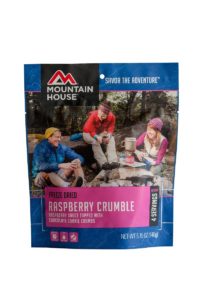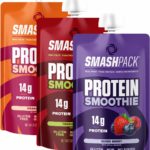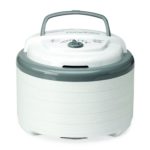Vegetarian Camping Meals – A Beginner’s Guide
by Josephine Y ·
This page may contain affiliate links. For more information, see our "About Us" page.
Vegetarian Camping Meals - A Beginner's Guide

With so many meal options, people with any kind of diet can easily enjoy backpacking trips. Many options include meat and meat products, especially prepackaged protein additives. But with some careful consideration, it’s easy to plan viable vegetarian camping meals for your backpacking or hiking trip. Also, head over to our article “Best Mess Kits for Backpacking & Camping” to make sure you have the proper pots, pans, and utensils at the ready! With that out of the way, let’s move on.
What can you eat for backpacking when vegetarian? The key will be high protein snacks for any athletic venture, and this is true especially for backpacking. Nuts are great snacks, but for meals you’re going to want to invest in a good dehydrator and bring high calorie food as well for quick energy while you’re on the trail.
It’s going to be important to think about how much you are willing to spend before you set out. There are lots of highly specialized vegetarian meal options out there, and while they can be easy and delicious, keeping yourself fed on the trail with a budget does not have to break the bank.
If you’re backpacking with a group, and not everyone is vegetarian, think about what food will be used in your cooking equipment. You will have to determine before you set out whether you are okay with meat or anything else you choose not to eat being prepared on the same cooking implements. It may be necessary to carry your own equipment for all food prep.
Junk food is an easy option for vegetarians these days, but depending on how long and strenuous your hike will be, it’s likely this will not be enough. While it might seem easy to hit a convenience store and stock up on the road this is not a long-term option. Eventually your body will crash if it is running on nothing but sugar and simple carbohydrates. You also want to watch out for extra salty snacks when planning your vegetarian camping meals, as this will up the amount of water you need to intake to keep from becoming dehydrated.
Meals
Besides rest, meals will be your primary source of energy when backpacking. These will have to be planned so you are not lugging around dead weight and so you do not run out of food options.
There are a variety of premade backpacking meals from providers, but sometimes it is best to bring ingredients that can be mixed to provide more unique meals each day. These can also help spice up prepackaged meals. There are a few vegetarian options by most companies. These are convenient because not only are they premade, but they can be made right in the pouch. For instance, Mountain House Raspberry Crumble is a nice dessert option that just requires water to prepare.
The first meal of the day is fairly easy, because you can eat much of what you eat at home. For breakfast look into cereals, granola mixes with dried fruit, bagels with nut butters, or other grab and go options that are easy to pack and can be found in your regular grocery store. Vegetarians can face numerous challenges when attempting to prepare food for their camping trips.
Bread may be tempting to bring along, but the compact shape of bagels and the ability of tortillas to be packed around things without getting smooshed makes these a better option. Fresh veggies and fruits may sound great as well, but these spoil quickly and can be awkward and heavy to pack in a backpack. Therefore, you are going to want to think about already prepared meals to be eaten while traveling. The good news is many of these meals will be similar to what you usually eat, just dehydrated.
Lunch options include nut butters on tortillas, bean paste, or anything else you like eating. Ideally this would consist of foods high in protein. If you have the time to pause while backpacking, you can also make or buy soups ahead of time and pack quickly prepared things like ramen noodles. Don’t forget to bring a condiment like hot sauce to quickly add flavor to even a meal you’ve had a few times this trip.
Ramen can be eaten for dinner as well, but don’t forget about classic options like rice and beans. Especially refried beans, the optimal mix of protein and carbs, this is a simple meal that can be spruced up with hot sauce and enjoyed relatively quickly after a full day of backpacking.
Dessert is fun whether at home or backpacking. It’s also a good time to get some extra carbs in for the hike ahead. Most prepackaged desserts are vegetarian already, but if you are traveling in a group, it’s a great time to make some cookies ahead of time to share. These are yet another opportunity to get in some energy and fiber-packed options like oats and dark chocolate.
Quick Snacks
Besides the standard nuts and dried fruit, there are a variety of prepackaged snacks available for quick energy. For instance, protein smoothies made with vegetarian options are widely available. The SmashPack is one choice made from MCT Oil, which is usually extracted from coconut oil. Quick snacks can be a wonderful choice for quick and easy camping food for vegetarians.
Protein bars have gained in popularity, allowing for a wide variety of options. The bonus for you is that you will not become bored with the same flavors and textures when out on the trail. Be sure to confirm the ingredients of bars. Some proteins are extracted from animals, but there are many options on the market that are 100% vegetarian.
Adding chia seeds or almonds to your snacks is a great idea. Also, choosing options that include oats and dark chocolate are good ways to ensure you are getting enough fiber while backpacking. This often forgotten dietary component is key to ensuring the most, ah, comfortable hiking possible.
Flavoring for water can add easy variety as well. Dehydrated powders for smoothies can be packed and brought along for quick additions to your standard fare. An extra benefit of these are that they provide vitamins you might be missing from a fully rehydrated diet.
Other Considerations
Eating primarily dehydrated food will mean you need access to water. This might require increasing the amount you are carrying with you, or planning to camp and prepare meals near water sources. Either way, planning ahead will mean you are not feasting on powder halfway through your backpacking trip.
You will also want to think about cooking gas if bringing a camp stove, or fire starting materials if you are not. With so many good options to heat up, you don’t want to eat every meal cold, even if you’re not cooking meat. Make sure you know which meals you will eat each day so you can plan exactly what supplies will be needed.
When preparing your own meals you will want to invest in a quality dehydrator ahead of time. A good example of one of the easier to use models is the Nesco Snackmaster Pro. These allow you to dry a wide variety of foods on separate trays, so you can prepare fruit, vegetables, or even entire meals ahead of time.
Also think about cooking while backpacking. Cooking equipment is going to add weight to your pack. Having a lot of meals that require specific prep, as opposed to normalizing the types of meals you are carrying and preparing, will increase the amount of equipment you are bringing. Think about the versatility of each of your food prep items and how many meals will require some kind of cooking.
That being said, you will also want to decide how much preparation you want to do before leaving. Prepping food of course takes time when you’re backpacking, and energy depending on what kind of meals you are planning. Making, packing, and dehydrating food ahead of time can save you valuable time.
How you want to store food is a consideration that must be made as well. This will ultimately depend on what else you are bringing and how heavy you are concerned about your pack becoming. There are options with food storage, including bulk storage or individually packed.
For instance, things like nut butters and individual meals come in both small packets or buckets and jars. Either can be useful when backpacking, but it may be more difficult to travel with a bucket than with parceled out bags. When purchasing, buy whatever is best for your budget, and then pack individually if needed.
Vegetarian Camping Meals - A Beginner's Guide - Conclusion
With these tips and ideas it should be easy to get together some options for delicious vegetarian camping meals. As always, planning ahead will be key. Remember to check the labels on prepackaged food for proteins taken from meat, and pack plenty of protein and fiber options. If you’re looking for more useful camping and backpacking information, check out our articles “How To Keep Drinks Cold In A Backpack” as well as “Backpacking Water – How Much to Bring?“. Happy traveling!






